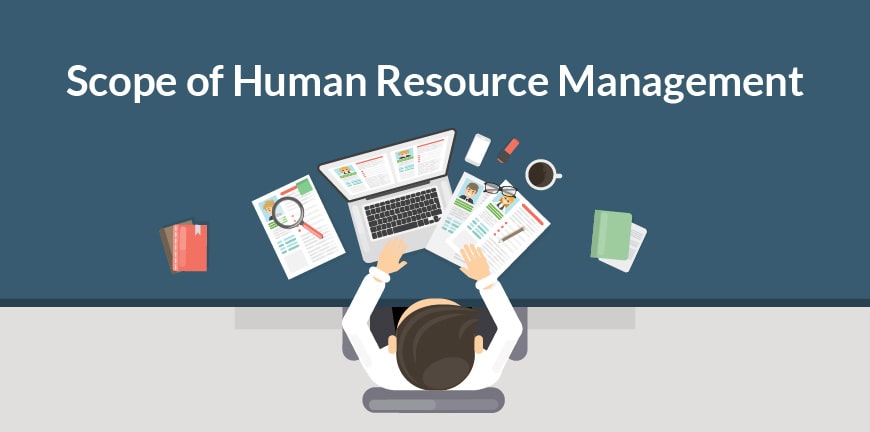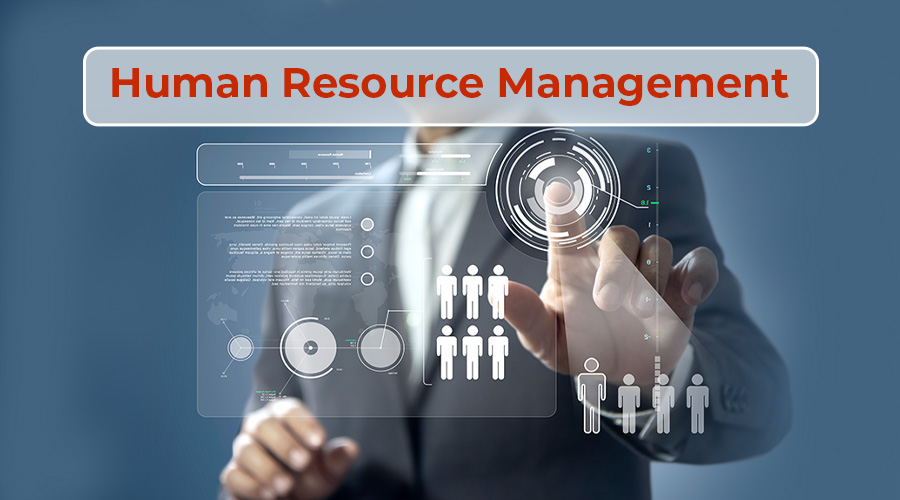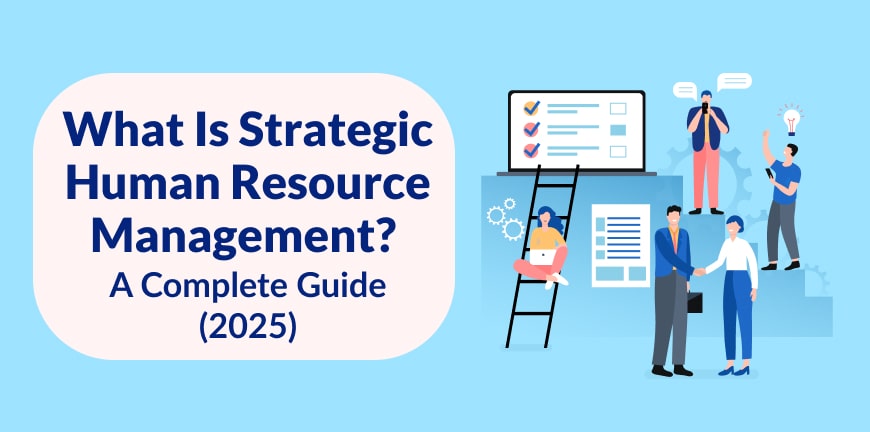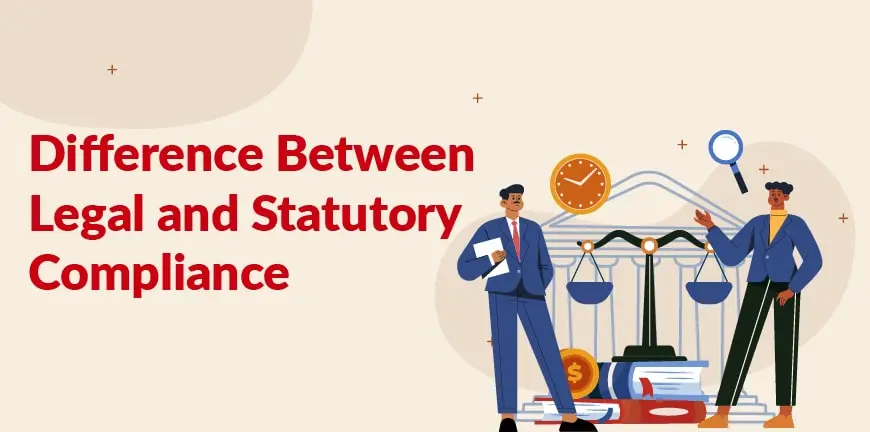
Difference Between Legal and Statutory Compliance
17/12/2025
How to Hire a Manager: Step-by-Step Guide for Recruiters & HR
17/12/2025- What is Human Resource Management?
- What Does “Scope of HRM” Mean?
- Why Is Human Resource Management Important?
- What are the Objectives of Human Resource Management?
- What is the Scope of Human Resource Management?
- Top 10 Key Functions of the HRM
- How Does HRM Operate at Different Organizational Levels?
- What Is the Internal and External Scope of HRM?
- How Has the Scope of HRM Evolved in the Digital Era?
- HRM vs. SHRM: What’s the Difference?
- What are the Challenges in HRM?
- What are the Future Trends in HRM?
- Reflecting on the Extensive Scope of HRM
- Key Takeaways
- Frequently Asked Questions (FAQs)
“Take care of your employees, and they’ll take care of your business.”- Richard Branson, Founder, Virgin Group.
What is the first thing that comes to mind when you hear the word HR (Human Resources)?
The people who are always bustling around to ensure employees’ paperwork is complete, or are busy scheduling meetings and interviews, organizing activities and seminars, the list goes on and on. and all of this with a smile on their face. Human resource management is more than just another department in an organization. They are the people who constantly look out, nurture, and manage the most valuable asset of an organization—the people.
The scope of human resource management is far more expansive than you can imagine. Due to its ever-evolving, dynamic, and far-reaching nature, it holds a huge significance in modern workplaces. Let’s dive deep and learn all about the scope of human resource management.
What is Human Resource Management?
Human resource management is a strategic approach to managing an organization’s workforce. From planning, hiring (recruitment and selection), induction, and orientation to Personnel management aspects like performance appraisal, development of new skills, and incentives, HRM (Human Resource Management) touches every facet of an organization, ensuring that its human capital is aligned with its mission, values, and objectives.
You may be wondering if this is the definition for HRM, then what is SHRM (Strategic Human Resource Management)? Is it the same?
HRM and SHRM are essentially the same, with a slight difference. Human resources are responsible for the day-to-day management of employees, while SHRM (Strategic Human Resource Department) focuses on creating a strategic plan for the success of an organization’s long-term goals.
A good SHRM strives to understand a company’s story, its goals, and objectives, and then creates foolproof strategies and policies that can help the company achieve its goals and support them.
What Does “Scope of HRM” Mean?
The scope of Human Resource Management (HRM) refers to the range of activities & functions involved in managing the workforce within an organization. The purpose and scope of human resource management include recruitment, selection, training, performance management, compensation, employee welfare, & compliance with labour laws.
The scope of human resource management also extends to employee engagement, retention, & strategic workforce planning. In today’s business environment, the nature and scope of strategic human resource management play a crucial role in aligning human resources with organizational goals, ensuring productivity, job satisfaction, & sustainable business growth.
Why Is Human Resource Management Important?
Here are 5 reasons that shed light on the importance and scope of human resource management:
1. Talent Acquisition & Retention
HRM ensures hiring the right talent & retaining skilled employees via strategic recruitment and engagement initiatives. According to LinkedIn surveys, Companies with strong HR practices see 40% higher employee retention.
2. Employee Productivity
Effective HRM enhances employee motivation, performance, and collaboration through training and recognition programs. As per SHRM reports, Organizations investing in HR development report a 37% spike in productivity.
3. Legal Compliance & Risk Management
HRM safeguards organizations by ensuring compliance with labour laws, workplace policies, & ethical practices. According to Deloitte, non-compliance penalties can cost companies up to 4% of global revenue.
4. Employee Engagement & Culture
HRM fosters a positive work culture, promoting satisfaction, loyalty, & teamwork across all levels. According to Gallup, highly engaged teams show 21% greater profitability, making HRM paramount.
5. Strategic Organizational Growth
HRM aligns human capital with long-term business goals, driving innovation and adaptability. According to PwC, Companies with strategic HR planning are 2.5x more likely to outperform competitors.
What are the Objectives of Human Resource Management?
The main objective of human resource management is to procure the right people for the right job in an organization. Apart from that, it aims at developing and maintaining a competent workforce, managing them simultaneously in a way that organizational goals are achieved.
Some of the objectives of an effective HRM include:
- Hiring competent and efficient employees with a zeal to work towards the organization’s goals.
- Utilizing the workforce at hand as effectively as possible
- Creating an effective and desirable workplace environment that supports work-life balance.
- Establishing a culture that increases employee satisfaction.
- Establishing and maintaining amicable relations between the staff and management
- Establishing and maintaining ethical policies internally and externally
- Reconciliation of personal goals with organizational goals
What is the Scope of Human Resource Management?
An organization’s main asset is its people. Having talented, efficient, and satisfied employees contributes to the success of an organization. So, what exactly is the scope of HRM in an organization? HRM is responsible for the entire lifecycle of an employee’s term in an organization. Right from planning their recruitment, their needs, and issues during their tenure, to when they exit the company. Naturally, the scope of Human Resource Management is wide and expansive.
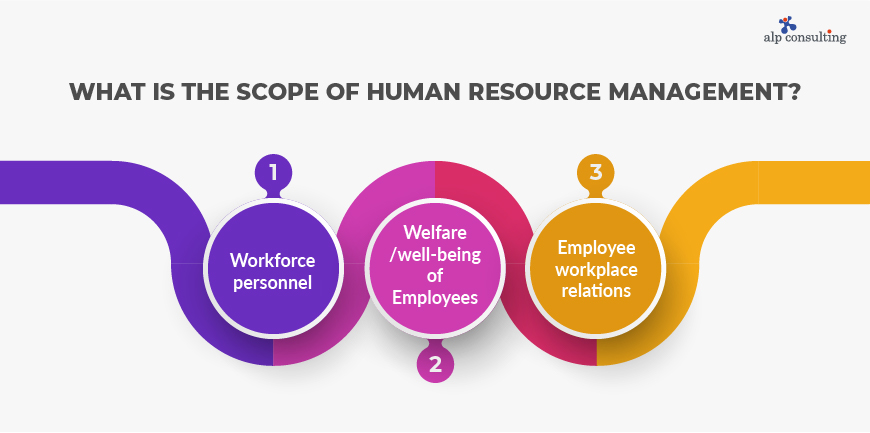
But just to give you a clear understanding, we have divided it into three major aspects.
1. Workforce personnel
The main objective here is to ensure the growth and development of employees in alignment with the organizational goals and objectives. It deals with everything from recruitment and selection to the development of new skills and incentives.
2. Welfare/ well-being of employees
It deals with creating a close-to-ideal working environment for employees. It is concerned with the working conditions and amenities of the workplace. Some of the basic responsibilities include taking into consideration services like cleanliness, rest and lunchrooms, housing, transport, health and safety, training, medical services, social security, and welfare funds.
3. Employee-workplace relations
Safeguarding employee interests is just as important as hiring the right person. Another key role of HRM is maintaining relations with the employee union, addressing their concerns, and settling disputes to maintain a non-chaotic, stress-free workplace and strike a balance between the employees and the management.
Top 10 Key Functions of the HRM
The functions of human resource management are numerous. But let us take a look at some of the most critical functions they are responsible for
HRs, please take note! Core Functions of HR Management:
1. Planning
Planning involves determining the organization’s goals and objectives and creating a strategic plan to achieve them. For HR, this means procurement of the right personnel for the right jobs.
But first, they need to evaluate and keep track of the number of people employed, the number of vacancies, whether the company is facing a shortage or has excess staff, and select candidates with the right qualifications required to fill those vacant positions.
2. Job analysis
Job analysis is what provides the basis for staff recruitment, training, and development. It involves identifying the inherent job requirement, meaning what the job role demands of the candidate.
Mapping out profiles with details of the skills required, responsibilities, and duties of the candidate helps in the recruitment and selection process.
Additionally, it also helps identify the necessary training that needs to be provided to candidates to help them upskill as well as thrive in the role.
3. Job Evaluation
Every organization has different hierarchical-level roles with distinct, complex responsibilities associated with each of them. The roles are graded and ranked based on their nature and level of complexity, and appropriate pay is determined and fixed as seen as suitable for a particular role.
4. Recruitment and Selection
To recruit the right candidates, you need to explore diverse sources. The employer brand identity also plays a key role in the recruitment process, as most candidates base their decision on brand identity. Since a strong brand speaks volumes about its reputation, it can attract top-tier candidates much more easily and procure a better-quality workforce. You can make use of various recruitment tools and techniques to guide you in the process.
Once you have a list of potential candidates with the desired educational qualifications and the right skills, you need to start the selection process. This involves rigorous screening of profiles of the potential candidates’ list. The screening procedure can include reviewing application letters, background checks, reference checks, a screening test with a set of questions to assess the candidate’s skills relevant to the job, and other assessments as required by the hiring manager.
5. Orientation and Placement
Post the recruitment and selection process, the HRM is to organize an induction/orientation program. During this process, the candidate is required to fill out certain paperwork that could include personal information, previous employment information, and confirm their status about taking up the position in your company.
In the orientation program, the candidate is made aware of the values, goals, and objectives of the organization.
Placement involves the settling of the candidate into their designated role at the organization. They are assigned tasks, duties, and responsibilities that encompass the job role. The newly appointed employees are briefed about the departmental goals and what is expected of them to help achieve those goals.
6. Training and development
Every candidate, even the best of the lot, requires a certain degree of training to perform their best in their roles. Once the candidate is placed in their respective job roles, to ensure job efficiency, you must identify their strengths and weaknesses and provide them with the required training.
The changing technological landscape demands that everyone be at their intellectual best if they are hoping to excel at their work. Training and development programs can help upskill candidates with new skills to keep up with the dynamic needs of the job.
7. Performance Appraisal
Employee performance appraisals are crucial for determining the candidate’s performance in their job roles. The evaluation of their performance gives the management insights into whether they meet the standard level or need extra training to improve their performance.
Performance appraisal also helps in determining their eligibility for promotions or pay hikes.
8. Employee compensation and benefits
One of the biggest motivators for every employee is attractive compensation and benefits. Providing candidates with bonuses and fair compensation for a job well done. The objective here is to incentivize the employees to perform their duties at an optimum level to derive the best results. HRM determines the salaries and wages to be paid, as well as rewards to better-performing employees.
9. Motivation, Employee welfare, health, and safety
As a department dedicated to overseeing the welfare of employees, the HRM of an organization must focus on providing a safer, cleaner, healthier environment by eliminating any workplace hazards. Implementation of flexible working hours and encouraging employees to take paid time off are some ways to boost their morale and become more productive.
10. Industrial Relations
As mentioned under Employee workplace relations in our previous segment, the HRM should play a proactive role in resolving disputes and addressing grievances as and when needed. The HR department must strike a balance between the employees and the management to achieve a high level of employee satisfaction as well as workplace efficiency.
How Does HRM Operate at Different Organizational Levels?
Human Resource Management (HRM) operates across three key organizational levels: strategic, managerial, and operational, each playing a prominent yet interconnected role in achieving business success.
1. Strategic Level
At the strategic level, the scope of human resource management is to focus on long-term goals and align human resource strategies with the company’s vision. HRM involves workforce planning, leadership development, & talent retention to ensure the organization has the right people for future growth. Moreover, strategic HR decisions directly govern business direction & competitiveness.
2. Managerial Level
At the managerial level, the purpose and scope of human resource management is to translate strategic goals into actionable plans. Additionally, HR managers oversee recruitment, training, performance appraisals, & employee engagement. They ensure smooth coordination between departments & maintain synchronisation between HR policies & organizational objectives to enhance efficiency and employee satisfaction.
3. Operational Level
At the operational level, the scope and objectives of human resource management are to manage daily administrative and employee-related activities. This includes payroll processing, attendance tracking, record maintenance, onboarding, and compliance management. Moreover, operational HR ensures accuracy, consistency, and compliance, forming the foundation for effective people management across all levels of the organization.
What Is the Internal and External Scope of HRM?
The scope of HRM is divided into internal & external dimensions. The internal scope of human resource management focuses on activities within the organization, such as recruitment, training, performance management, compensation, employee relations, & welfare. It ensures employees are motivated and aligned with business goals.
On the other hand, the external scope and objectives of human resource management deal with factors outside the organization, including labour laws, market trends, technological advancements, & socio-economic changes. Together, both enable HRM to maintain workforce efficiency while adapting to external business environments.
How Has the Scope of HRM Evolved in the Digital Era?
1. Automation of HR Processes
Digital tools automate payroll, attendance, & recruitment. These frameworks reduce manual errors and increase efficiency across HR functions.
2. Data-Driven Decision Making
HR analytics helps organizations predict attrition, measure performance, & make informed talent management decisions.
3. Remote Work Management
Technology enables flexible work models, improving employee engagement & productivity through virtual collaboration tools.
4. AI-Powered Recruitment
Artificial intelligence in HRM streamlines candidate screening, shortlisting, & onboarding, thereby enhancing hiring accuracy and speed.
5. Continuous Learning Platforms
E-learning systems empower employees with upskilling opportunities, fostering continuous growth & career development.
HRM vs. SHRM: What’s the Difference?
Here are the key differences between HRM vs SHRM:
| Aspect | HRM (Human Resource Management) | SHRM (Strategic Human Resource Management) |
| 1. Focus | Focuses on day-to-day employee management and HR operations. | Focuses on aligning HR policies with long-term business strategy. |
| 2. Approach | Reactive in nature, addressing immediate workforce needs. | Proactive and future-oriented, anticipating organizational challenges. |
| 3. Time Horizon | Short-term focus on administrative and operational efficiency. | Long-term focus on organizational growth and sustainability. |
| 4. Responsibility | Primarily, the HR department’s responsibility. | Involves top management and integrates HR with overall business goals. |
| 5. Objective | Ensures compliance, employee welfare, and routine HR functions. | Drives competitive advantage through strategic talent and leadership management. |
What are the Challenges in HRM?
1. Talent Acquisition and Retention
Finding and retaining skilled employees has become increasingly arduous due to competition, changing job expectations, & evolving workforce dynamics in global markets.
2. Adapting to Technological Change
Integrating AI, automation, & digital tools into HR processes necessitates continuous learning, upskilling, & adapting traditional systems for better efficiency.
3. Managing Remote and Hybrid Workforces
Balancing flexibility, productivity, communication, & engagement in remote work models poses serious challenges in maintaining collaboration and company culture.
4. Ensuring Legal and Regulatory Compliance
HR must stay updated with evolving labour laws, diversity regulations, & data protection standards to avoid penalties and maintain ethical practices.
5. Employee Engagement and Well-being
Sustaining motivation, mental health, & job satisfaction amid fast-paced change and workplace stress remains a top HR challenge worldwide.
What are the Future Trends in HRM?
The future trends in HRM in 2026 include:
1. AI and Automation in HR
Artificial intelligence will streamline recruitment, performance tracking, & analytics, making HR operations faster and much more data-driven.
2. Focus on Employee Experience
Organizations will prioritize holistic employee experiences, blending engagement, wellness, & career growth for better retention and satisfaction.
3. Hybrid Work Models
Flexible work structures combining remote and office setups will dominate, enhancing work-life balance & organizational adaptability.
4. Continuous Learning and Upskilling
Continuous learning platforms will empower employees to adapt quickly to technological & industry changes, boosting innovation.
5. Data-Driven HR Decision Making
Advanced analytics will guide HR strategies, enabling precise forecasting, personalized engagement, & evidence-based workforce management.
Reflecting on the Extensive Scope of HRM
The future scope of human resource management (HRM) is likely to continue expanding as organizations recognize the value of their human capital and the need to create inclusive, engaging, and adaptable workplaces.
As new challenges and opportunities emerge in the global business landscape in 2026, HR professionals need to stay agile, innovative, and well-versed in the latest trends and technologies.
As a leading HR agency in India, Alp Consulting can provide a wide range of services that support and enhance your HR management efforts, allowing your organization to operate more efficiently, comply with regulations, and attract and retain the right talent.
As businesses and the workplace continue to transform, HRM will remain a pivotal force in driving success, growth, and employee well-being.
Key Takeaways
- HRM strategically manages human capital to align workforce performance with organizational goals and objectives.
- The scope of human resource management spans recruitment, training, welfare, performance management, and legal compliance.
- Technology and AI are revolutionizing HR processes, making them data-driven and efficiency-focused.
- Employee experience, engagement, and continuous development define future HRM priorities in 2026.
- HRM remains vital for fostering productivity, innovation, and sustainable organizational growth.
Frequently Asked Questions (FAQs)
1. What is the meaning of scope in HRM?
We can define the scope of human resource management as an umbrella term that covers all employee-related functions like recruitment, training, development, compensation, motivation, & performance management for organizational success.
2. What is the primary role of HRM?
The primary purpose and scope of human resource management is to manage human capital effectively to align workforce performance with organizational goals and strategic objectives.
3. Why is recruitment and selection so important within HRM?
Recruitment and selection within the nature and scope of strategic human resource management ensure the right talent fits the right job, thereby improving productivity, retention,& overall organizational efficiency.
4. How does HRM handle employee development?
The scope of human resource management includes employee development through continuous training, mentoring, performance appraisals, and career planning to enhance skills and growth potential.
5. How has technology changed the scope of HRM?
Technology revolutionized HRM by automating payroll, recruitment, analytics, and performance tracking, enhancing efficiency, transparency, and employee engagement.
6. How does HRM ensure legal compliance?
HRM ensures legal compliance by adhering to labour laws, workplace safety, fair pay, diversity, and employee rights regulations consistently.
Contact Us For Business Enquiry

Rajkumar Shanmugam
Rajkumar Shanmugam is the Head of HR at ALP Consulting, bringing over 19 years of comprehensive HR leadership experience across India and international markets. His expertise spans talent acquisition, employee relations, performance management, compliance, and HR transformation. Rajkumar has a proven track record of driving people-centric initiatives, enhancing workplace culture, and aligning HR strategy with business goals. With extensive experience in US staffing operations and global mobility, he continues to lead organizational excellence through innovation and employee engagement.

